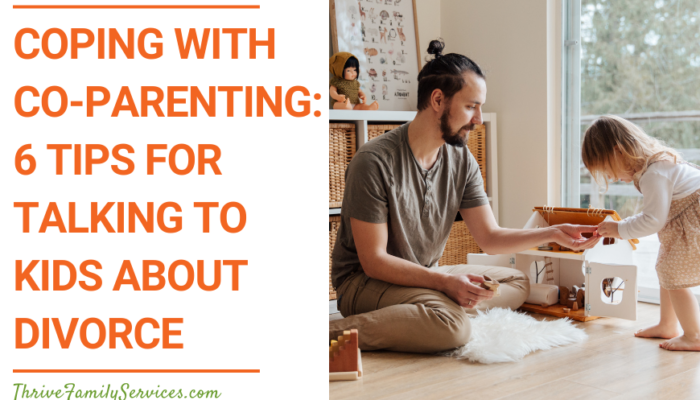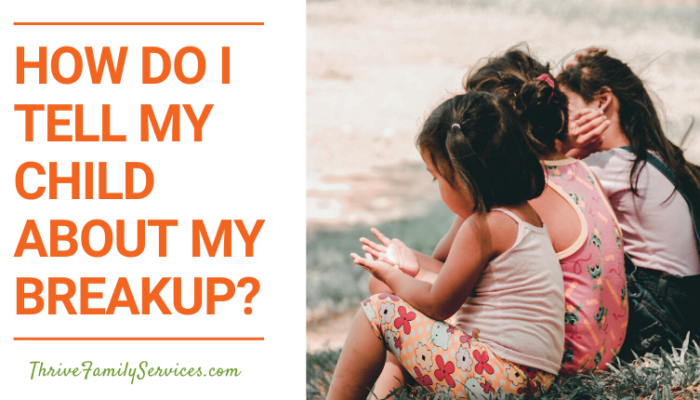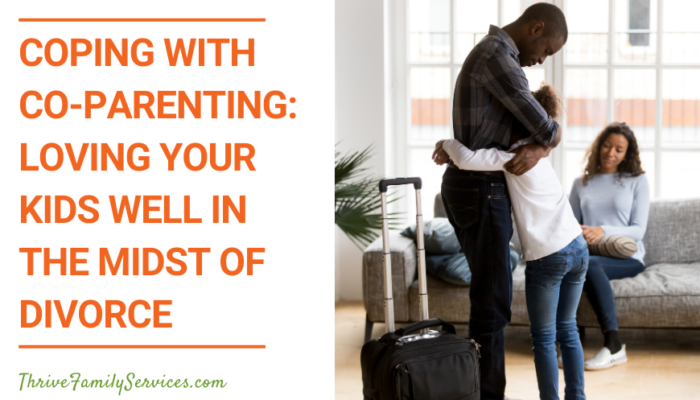“When we deny our stories, they define us.
When we own our stories, we get to write the ending.”
– Brené Brown
Talking about divorce can be heartbreaking, especially when sharing it with those who matter most to you: your children. Here are some tips from experts in the field to help you navigate these tough conversations with thoughtfulness and compassion.
1) Uphold a united front.
Try to discuss the separation with your children together as a couple (Herrick, 2020). For the sake of your kids’ wellbeing, work as a team, and express mutual care and concern for your children and one another. If this is difficult to do, wait to have the conversation so you can do so in a peaceful manner without obvious tension or stress. A major component in maintaining a healthy relationship with your children post-divorce is being able to participate in open and honest communication (James, 2010).
2) Create & communicate a plan.
Let your kids know what is coming. This plan does not need to be detailed, but it will be important for children to understand upcoming decisions so they feel safe and know what to expect (Herrick, 2020). For instance, what parent will stay in the house and what parent will be staying elsewhere? How often will your kids see each one of you? When will your children be with just one parent or see both parents? What will going to school look like? Who else knows about the separation and can be additional support for your children to turn to? Allow your kids to ask questions and feel free to admit when you don’t know the answer. This protects you from promising anything you may not be able to deliver on.
3) Time it right.
It may be important to wait to tell your children about a pending separation or divorce until after a recurring event that will get triggered every year. If you tell your child about the divorce around birthdays or holidays, each time that event recurs, kids can relive the twinge of grief they experienced which may impact your children’s healing process (Sheff, 2020). Try to be patient and wait to tell them until after these special days have passed.
4) Normalize your kids’ feelings.
Kids (and adults) may feel distraught, angry, worried, confused, and even curious about the future. You can assure your kids that whatever they are feeling is normal and that you as parents are there to listen to any emotion that comes up (Herrick, 2020). Don’t be surprised if your children respond to the conversation with a seeming tangent. Every child has a different way to process, and it may take your kids some time to let you know what they are truly experiencing.
5) Assure the children of your unwavering love for them.
Let your kids know that you are still a family and that you will both be their parents no matter what. Children many times take the blame for your separation and secretly think they can fix things in the relationship. Let them know from the very beginning that this was your decision and nothing your kids did (or didn’t do) could have influenced your joint decision. Assure them that no matter how hard this feels for them right now, you both will love them forever.
6) Keep communication open.
Divorce is not a one-time event but is full of complex interactions and transitions (Allan, 2016). Follow up with your children individually after your first conversation to see how they are feeling and to reassure them of your love. Families who believe in the value of open communication are more likely to support one another post-divorce (James, 2010). If your kids aren’t expressing themselves verbally, offer to write letters or draw pictures together about how they feel. As you model open communication, your children will see that they too can bring up concerns and questions as they make sense of your family’s new normal.
Where can you go for help?
Here at Thrive, we hope to offer compassion-filled divorce and separation counseling so you can continue to provide your children with a safe and stable family environment. Contact 303-513-8975 or info@thrivefamilyservices.com to get in touch with a professional who can assist you with divorce care.
REFERENCES
- Herrick, Lisa (2020). Guide to telling the children about the divorce. Retrieved from LisaHerrick.com.
- James, Casey L. (October 2018). Communication in divorced families with children. Western Michigan University. 10 (2). Retrieved from ScholarWorks.
- Sheff, Honey A. (2020). When not to tell your kids about divorce. Retrieved from Collaborative Divorce Texas.



